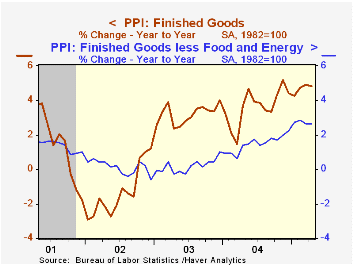 Global| May 17 2005
Global| May 17 2005PPI Gains Broad
by:Tom Moeller
|in:Economy in Brief
Summary
The Producer Price Index for finished goods rose 0.6% last month and again surpassed Consensus expectations which had been for a 0.4% increase. Excluding food & energy the PPI rose 0.3% in April, up sharply from the 0.1% gains during [...]

The Producer Price Index for finished goods rose 0.6% last month and again surpassed Consensus expectations which had been for a 0.4% increase. Excluding food & energy the PPI rose 0.3% in April, up sharply from the 0.1% gains during the prior two month's and also beat Consensus expectations for a 0.2% increase.
Prices for finished consumer goods less food & energy rose 0.2% (2.6% y/y), up from a 0.1% increase in March. Consumer durable goods prices increased 0.3% (1.9% y/y) following two months of decline as household appliance prices rose (2.0% y/y) along with furniture prices (3.8% y/y).
Capital goods prices increased for the second month (2.8% y/y) though computer prices continued to fall (-18.7% y/y) as did prices for light trucks (-0.5% y/y).
Finished energy prices jumped for the third consecutive month. The 2.1% (15.7% y/y) increase was led by higher prices for gasoline (28.9% y/y) and fuel oil (51.1% y/y). Finished food prices ticked up 0.1% (2.5% y/y) last month.
Intermediate goods prices again were strong, posting a 0.8% advance which reflected a 3.4% (18.8% y/y) spike in energy prices but the 0.2% monthly increase in core intermediate prices was the most moderate since 2003.
Crude prices surged another 2.7% again on the strength of energy prices, up 7.2% (32.6% y/y). The 0.8% gain in core crude prices was the second month of strength and reflected a 17.1% y/y gain in copper scrap, an 8.3% y/y increase in aluminum scrap and a 4.3% y/y rise in iron & steel scrap. During the last thirty years "core" crude prices have been a fair indicator of industrial sector activity with a 48% correlation between the six month change in core crude prices and the change in factory sector industrial production.
| Producer Price Index | April | March | Y/Y | 2004 | 2003 | 2002 |
|---|---|---|---|---|---|---|
| Finished Goods | 0.6% | 0.7% | 4.8% | 3.6% | 3.2% | -1.3% |
| Core | 0.3% | 0.1% | 2.6% | 1.5% | 0.2% | 0.1% |
| Intermediate Goods | 0.8% | 1.0% | 8.2% | 6.6% | 4.6% | -1.5% |
| Core | 0.2% | 0.3% | 6.6% | 5.7% | 2.0% | -0.5% |
| Crude Goods | 2.7% | 4.3% | 11.8% | 17.5% | 25.1% | -10.6% |
| Core | 0.8% | 1.0% | 8.4% | 26.6% | 12.4% | 3.8% |
Tom Moeller
AuthorMore in Author Profile »Prior to joining Haver Analytics in 2000, Mr. Moeller worked as the Economist at Chancellor Capital Management from 1985 to 1999. There, he developed comprehensive economic forecasts and interpreted economic data for equity and fixed income portfolio managers. Also at Chancellor, Mr. Moeller worked as an equity analyst and was responsible for researching and rating companies in the economically sensitive automobile and housing industries for investment in Chancellor’s equity portfolio. Prior to joining Chancellor, Mr. Moeller was an Economist at Citibank from 1979 to 1984. He also analyzed pricing behavior in the metals industry for the Council on Wage and Price Stability in Washington, D.C. In 1999, Mr. Moeller received the award for most accurate forecast from the Forecasters' Club of New York. From 1990 to 1992 he was President of the New York Association for Business Economists. Mr. Moeller earned an M.B.A. in Finance from Fordham University, where he graduated in 1987. He holds a Bachelor of Arts in Economics from George Washington University.
More Economy in Brief
 Global| Feb 05 2026
Global| Feb 05 2026Charts of the Week: Balanced Policy, Resilient Data and AI Narratives
by:Andrew Cates






